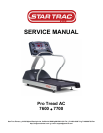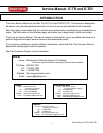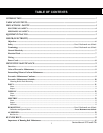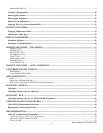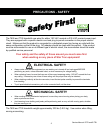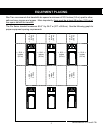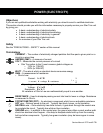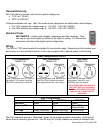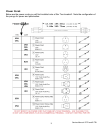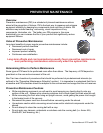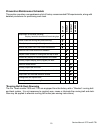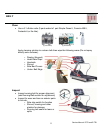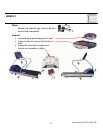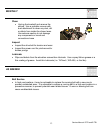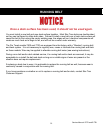
Service Manual: E-TR and E-TRi
6
POWER (ELECTRICITY)
Objectives
If you are not qualified/comfortable working with electricity you should consult a certified electrician.
This section should provide you with the information necessary to properly service your Star Trac unit
by giving you:
x A basic understanding of electrical safety
x A basic understanding of electrical terminology
x A basic understanding of electricity in general
x A basic understanding of electrical tools
x An overview of your Star Trac unit
Safety
See the “PRECAUTIONS – SAFETY” section of this manual.
Terminology
CURRENT – The number of electrically charged particles that flow past a given point on a
circuit in a given time
AMPERE (AMP) – A measure of current
VOLT – Measures the current pressure of a circuit
x Star Trac refers to the 2 most common global voltages as:
o 110V (or 110VAC)
o 220V (or 220VAC)
WATT – The rate at which an electrical device consumes energy
OHM – A measurement of resistance
o Ohm’s Law:
Current:
I = V / R
I = current, V = voltage, R = resistance
V
I =
R
Depending on what you are trying to solve, other variations can be made:
Voltage:
Resistance:
V = I x R
R = V / I
All variations of Ohm’s Law are mathematically equal to one another.
RESISTANCE – Used to dissipate passing current into heat to lower a voltage. Resistance
is measured in Ohm’s.
POTENTIOMETER (POT) – An electronic component which has an adjustable resistance
HOT wire – Delivers power to the unit. Typically has black, brown, or red insulation
NEUTRAL wire – Once electricity has done its work, it goes back through the neutral wire
to complete the circuit. Typically has white or blue insulation
GROUND wire – In addition to the neutral wire, the ground wire offers current another path
should an electrical short happen. Also help to dissipate static build-up from the running
belt and other components. Typically has green insulation (may be bare copper in some
cases)



